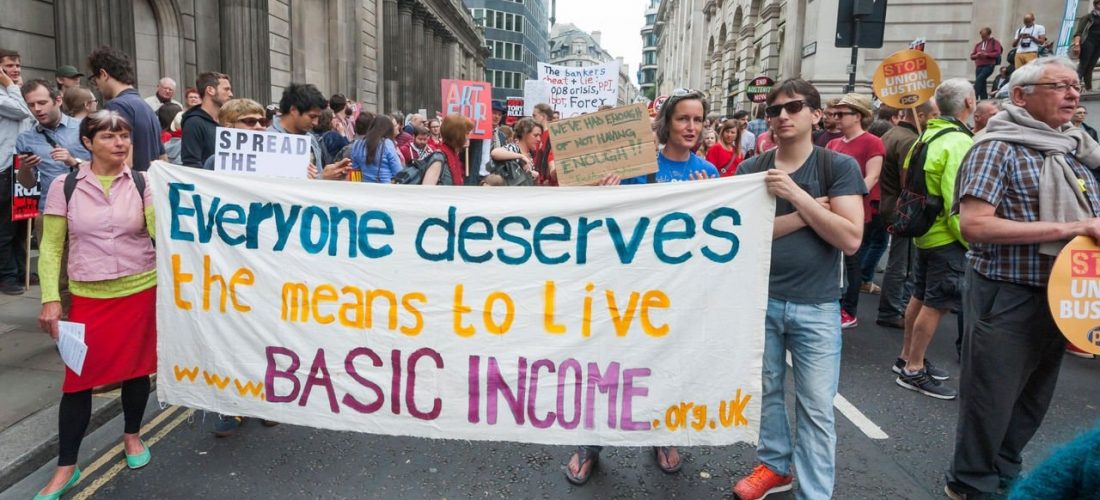Articolo pubblicato sul sito del giornale The Guardian in merito al citizen income (reddito di cittadinanza). Il testo è in inglese.
Any attempt to challenge the elite needs courage, inspiration and a truly groundbreaking proposal. Here are two to set us off. Most of the world’s people are decent, honest and kind. Most of those who dominate us are inveterate bastards. This is the conclusion I’ve reached after many years of journalism. Writing on Black Monday, as the British government’s full-spectrum attack on the lives of the poorcommences, the thought keeps returning to me.
“With a most inhuman cruelty, they who have put out the people’s eyes reproach them of their blindness.” This government, whose mismanagement of the economy has forced so many into the arms of the state, blames the sick, the unemployed, the underpaid for a crisis caused by the feral elite – and punishes them accordingly. Most of those affected by the bedroom tax, introduced today, are disabled. Thousands will be driven from their homes, and many more pushed towards destitution. Relief for the poor from council tax will be clipped; legal aid for civil cases cut off. Yet at the end of this week those making more than £150,000 a year will have their income tax cut.
Two days later, benefit payments for the poorest will be cut in real terms. A week after that, thousands of families who live in towns and boroughs where property prices are high will be forced out of their homes by the total benefits cap. What we are witnessing is raw economic warfare by the rich against the poor.
So the age-old question comes knocking: why does the decent majority allow itself to be governed by a brutal, antisocial minority? Part of the reason is that the minority controls the story. As John Harris explained in the Guardian, large numbers (including many who depend on it) have been persuaded that most recipients of social security are feckless, profligate fraudsters. Despite everything that has happened over the last two years, Rupert Murdoch, Lord Rothermere and the other media barons still seem to be running the country. Their relentless propaganda, using exceptional and shocking cases to characterise an entire social class, remains highly effective. Divide and rule is as potent as it has ever been.
But I’ve come to believe that there’s also something deeper at work: that most of the world’s people live with the legacy of slavery. Even in a nominal democracy like the United Kingdom, most people were more or less in bondage until little more than a century ago: on near-starvation wages, fired at will, threatened with extreme punishment if they dissented, forbidden to vote. They lived in great and justified fear of authority, and the fear has persisted, passed down across the five or six generations that separate us and reinforced now by renewed insecurity, snowballing inequality, partisan policing.
Any movement that seeks to challenge the power of the elite needs to ask itself what it takes to shake people out of this state. And the answer seems inescapable – hope. Those who govern on behalf of billionaires are threatened only when confronted by the power of a transformative idea.
A century and more ago the idea was communism. Even in the form in which Marx and Engels presented it, its problems are evident: the simplistic binary system into which they tried to force society; their brutal dismissal of anyone who did not fit this dialectic (“social scum”, “bribed tool[s] of reactionary intrigue”); their reinvention of Plato’s guardian-philosophers, who would “represent and take care of the future” of the proletariat; the unprecedented power over human life they granted to the state; the millenarian myth of a final resolution to the struggle for power. But their promise of another world electrified people who had, until then, believed that there was no alternative.
Seventy years ago, in the UK, the transformative idea was freedom from want and fear through the creation of a social security system and a National Health Service. It swept a Labour government to power which was able, despite far tougher economic circumstances than today’s, to create a fair society from a smashed, divided nation. This is the achievement which – through a series of sudden, spectacular and unmandated strikes – Cameron’s government is now demolishing.
So where do we look for the idea that can make hope more powerful than fear? Not to the Labour party. If Ed Miliband cannot bring himself even to oppose a bill which retrospectively denies compensation to cheated jobseekers, the most we can expect from him is a low-alcohol conservatism of the kind that doused all aspiration under Tony Blair.
Last week I ran a small online poll, asking people to nominate inspiring, transfiguring ideas. The two mentioned most often were land value taxation and a basic income. As it happens, both are championed by the Green party. On this and other measures, its policies are by a long way more progressive than Labour’s.
I discussed land value taxation in a recent column. A basic income (also known as a citizen’s income) gives everyone, rich and poor, without means-testing or conditions, a guaranteed sum every week. It replaces some but not all benefits (there would, for instance, be extra payments for pensioners and people with disabilities). It banishes the fear and insecurity now stalking the poorer half of the population. Economic survival becomes a right, not a privilege.
A basic income removes the stigma of benefits while also breaking open what politicians call the welfare trap. Because taking work would not reduce your entitlement to social security, there would be no disincentive to find a job – all the money you earn is extra income. The poor are not forced by desperation into the arms of unscrupulous employers: people will work if conditions are good and pay fair, but will refuse to be treated like mules. It redresses the wild imbalance in bargaining power that the current system exacerbates. It could do more than any other measure to dislodge the emotional legacy of serfdom. It would be financed by progressive taxation – in fact it meshes well with land value tax.
These ideas require courage: the courage to confront the government, the opposition, the plutocrats, the media, the suspicions of a wary electorate. But without proposals on this scale, progressive politics is dead. They strike that precious spark, so seldom kindled in this age of triangulation and timidity – the spark of hope.







